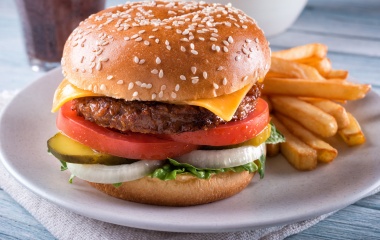
When I mention to people that it is likely worse to smoke than to eat pork, I often get strange looks. And usually the more observant the person, the stranger the look. Knowing the centrality of kashrut—especially the aversion to eating pork—and the rabbinic debate as to whether smoking is, in fact, prohibited by Jewish law[1], this seems like a ludicrous claim. But ludicrous it is not—it is actually rather obvious.
“Rabbi Abba asked Rav Huna the following: If a wolf came and took the innards of a slaughtered animal, would it still be kosher?" (Chulin 9a).
An otherwise kosher animal can be rendered non-kosher in one of two ways. If it is not slaughtered properly it becomes a neveilah, and if it had a terminal illness that would (likely) kill it within a year, it is rendered a treifah. One of the treifot listed in the Mishna (Chulin 42a) is torn innards.
As the Gemara explains, Rav Abbas’s question refers to a case in which, before one has a chance to examine the intestines to ensure that there are no perforations, a wolf took them, and when they were recovered, they had perforations in them. Rav Abba wondered if we need fear that the perforations existed beforehand and the wolf happened to bite on that pre-existing perforation and the animal is a treifah. Or can we safely assume it was the wolf that caused the damage to the intestines? Rav Huna answered that we can safely assume it was the wolf that caused the damage, and we can declare the animal kosher.
Rav Abba was not convinced this lenient ruling was correct—Rav Huna quoted no sources for his view—and raised the following objection. The Talmud, quoting the Tosefta, rules that if we see a bird pecking at a fig, or a mouse doing the same with a melon, we may not eat the fruit. We must fear that any hole they may have created was actually a pre-existing one created by a snake and hence, it would be most dangerous to eat the fruit. Living in an era when snakes abounded, our Sages forbade drinking uncovered and unattended liquids, fearing that a snake had left its venom in the liquid. Even as we see a mouse boring into the fruit, we must fear that a snake did so first, despite the long odds. How, then, can we eat meat that was taken by a wolf? Should we not fear that the wolf bit on an already-perforated intestine?
Rav Huna’s response is sharp and to the point. “How can you compare that which is forbidden ritually to that which is forbidden on account of possible danger to life?!” Danger to life operates on a different, much more serious, plane that a Torah prohibition. “Danger is more severe than prohibition[2]” (Chulin 10a). Even when it is merely doubtful that something might pose a risk to one’s health, we must avoid it. And the risk to smokers has long since passed the threshold of a doubtful danger into an absolute danger[3].
That “danger is more severe than prohibition” is so basic it hardly needs stating. It is a simple extension of the laws of pikuach nefesh, the obligation to violate the laws of the Torah if there is a possible danger to life, even if it is far-fetched[4].
Thankfully, modern living and modern science have eliminated many of the life-threatening common activities of the past, and the Shulchan Aruch (Yoreh Deah 116:1) rules that nowadays, we no longer need to worry about snake poison in unattended liquids. However, danger is not limited to snakes or smoking, and the list of prohibited activities has to be constantly evaluated and re-evaluated.
Amongst the activities prohibited by the Shulchan Aruch (Yoreh Deah 116: 5) is putting coins in one’s mouth. While today, we would look askance at such a boorish activity, this made perfect sense in an age when the value of coins was determined by the amount of gold they contained. As gold was a soft medal, in order to verify that the coins actually did contain the precious metal, people would bite on them. Yet despite the economic reason to do so, the danger involved outweighed such a concern.
This is all the more interesting considering that the prohibition of drinking exposed liquids applied only to water, milk and wine (Chulin 49a). As the risk of snake venom in other liquids was very, very low, our Sages did not prohibit such, “as the Torah has mercy on the money of Israel” and doing so would be an economic burden[5]. Perhaps our rabbis felt the that only the lowest of the low would commit fraud, and hence, the benefit of biting the coin was too small to allow one to take that risk, whereas the cost-benefit calculus regarding using exposed honey was such that they allowed one to consume it.
Everything we do carries some risk. “G-d guards the simple” (Tehillim 116:6) serves as the Biblical licence to engage in normal, everyday activities despite the small risks involved. But going beyond those risks is something to be avoided, much more so than avoiding non-kosher food.
[1] Thankfully, this debate is pretty much over and it is generally accepted that whatever may have been in the past, smoking today is prohibited. See here for the statement of the Rabbinical Council of America prohibiting smoking.
[2] One often hears people comparing non-kosher food to “poison”, arguing that just as we would avoid taking any risks with poison, how could we consider taking risks with kosher food? As I think has been obvious from what we have learned to date in Chulin, such is not the case, and Rav Huna sums it up most clearly. We must eat only kosher, but non-kosher food is not poison.
[3] While a fuller discussion of risk-taking—including the difference between immediate vs. long term risks—is beyond the scope of this devar Torah, let us simply state that for most people, the gap between how careful they are about the laws of kashrut as compared to healthy eating is much too wide. Not only must it be narrowed, one could argue that our meticulousness in these areas must be reversed.
[4] What is not clear in the Gemara is whether the excess care we must have regarding danger is said vis-a-vis all mitzvot, or only regarding ritual mitzvot such as kashrut. If not for the fact that G-d commanded such, there would be no reason to keep kosher. One can be an upstanding person of high moral character even if one eats treif. Hence, we can understand that kashrut is less important than safety. But perhaps one can argue that regarding the ethical mitzvot, where non-compliance does impact on one’s moral being, there is no such distinction. It is not that danger is any less severe, but rather that acting ethically is more important. Perhaps there is little difference between ingesting possibly poisonous foods and dealing in possibly stolen goods. One puts one’s physical body in danger, and one puts one’s spiritual being in danger.
[5] Whether this reflects the great concern the Torah had with wasting even a few pennies or the extreme poverty of many Jews, I will leave for you to ponder.



